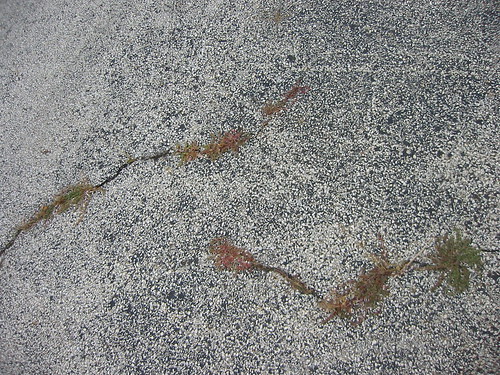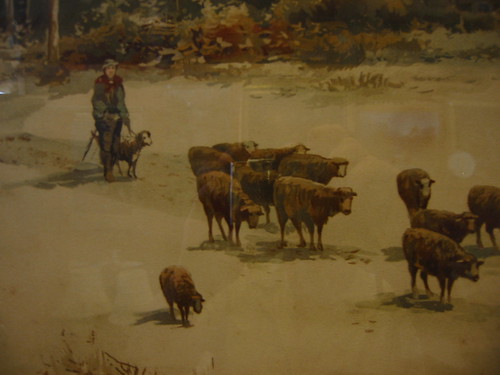
A Sign
“A congeries of essences must find a form, and the form must be coherent and harmonious.” Guy Davenport, in the “Postscript” to
Twelve Stories, collecting “the ones,” he writes, “I choose to salvage . . . outworks to the long and densely collaged novelle . . .” With the novelle subsequently named. And a sentence or two (“The Gingham Dress I heard with my own ears”) apropos
les origines of each of the “outworks”: “‘The Bowmen of Shu’ begins with a letter from Henri Gaudier-Brzeska, written from the trenches in 1915, that John Cournos showed me one evening in Haverford, taking it from its envelope, while remembering introducing Gaudier to Pound fifty years before.” Beginning:
27 December 1914
Here we are picking the first fern shoots and saying when shall we get back to our country, away from das Trommelfeurer, the gunners spent like winded dogs, white smoke and drizzle of sparks blowing across barbed wire in coils, the stink of cordite. 27 December 1914. Avalanches of shrapnel from field guns firing point-blank with fuses set at zero spray down in gusts, an iron windy rain. Here we are because we have the huns for our foemen. It’s with pleasure, dear Cournos, that I’ve received news from you. We have no comfort because of these Mongols. You must have heard of my whereabouts from Ezra to whom I wrote some time ago. Since then nothing new except that the weather has had a change for the better. We grub the soft fern shoots, the rain has stopped for several days and with it keeping the watch in a foot deep of liquid mud, the crazy duckwalks, hack and spit of point guns.
Pound’s “Song of the Bowmen of Shu”—with the tag “By Bunno, reputedly 1100 B.C.”—begins (in
Personae): “Here we are, picking the first fern-shoots / And saying: When shall we get back to our country? / Here we are because we have the Ken-nin for our foemen, / We have no comfort because of these Mongols. / We grub the soft fern-shoots . . .” Pound disastrously rework’d the piece for the 1954
Classic Anthology: “Pick a fern, pick a fern, ferns are high, / ‘Home,’ I’ll say: home, the year’s gone by, / no house, no roof, these huns on the hoof. / Work, work, work, that’s how it runs, / We are here because of these huns. . . .” In
Gaudier-Brzeska, Pound quotes the sculptor (out of a letter of 18 December 1914): “The poems depict our situation in a wonderful way. We do not yet eat the young nor old fern shoots, but we cannot be over victualled where we stand . . .” Later: “When we took to the trenches after the march it was a sight worthy of Dante, there was at the bottom a foot deep of liquid mud in which we had to stand two days and two nights . . .” And out of a later letter (11 April 1915) “to Mrs. Shakespear”: “E . . . has sent me the Chinese poems. I like them very much. I keep the book in my pocket, indeed I use them to put courage in my fellows. I speak now of the ‘Bowmen’ and the ‘North Gate’ which are so appropriate to our case.”
Tom McCarthy, in
C (Jonathan Cape, 2010), two-man aeroplanes (pilot and observer) flying back and forth above the trenches in order to provide target coordinates to ground batteries in a series of finely limn’d trajectories: “Each time they shuttle to and fro, they pass through residues of tracer, Archie smoke and their own exhaust fumes hanging in the air. The shapes made when trails intersect, lines cutting across other lines at odd angles or bisecting puffballs’ circles to form strange figures . . .” Figures like “phonetic characters,” a code, a language. A howitzer shell noses up out of the smoke to accompany the flyers (“surfacing above the smoke-bank like a porpoise swimming alongside a ship, slowly rotating in the air to show its underbelly as it hovers at its peak before beginning its descent”), oddly companionable
and aesthetick’d up (the doings become “pure geometry”: “the shell’s a pencil drawing a perfect arc across a sheet of graph paper; he’s the clamp that holds the pencil to the compass, moving as one with the lead; he
is the lead smearing across the paper’s surface to become geometry himself . . .”) Compare Davenport’s Gaudier-Brzeska in “The Bowmen of Shu”:
Les Fallacieux Détours du Labyrinthe
The rifles, crack! thuck! whip at the bob of helmets of the boches in the trenches across the desolation of an orchard. If they stir too busily at a point our mitrailleuses rattle at them, their tracers bright as bees in a garden even in this dead light. With my knife I have carved the stock of a German rifle into a woman with her arms as interlocked rounded triangles over her head, her breasts are triangles, her sex, her thighs. Like the Africans I am constrained by the volume of my material, the figure to be found wholly within a section of trunk . . .
Is it the human scale of World War I that allows its aestheticizing? (Davenport, in essays, too, participates: see the florid report of the bombardment of Reims Cathedral in “The Pound Vortex,” a review of Kenner’s
The Pound Era: “In the charge Corporal Gaudier was cut to pieces by machine-gun fire. He was twenty-three years old. He was descended from sculptors who had worked on Chartres. The preceding November he had lain in mud and watched a cathedral burn, the lead of its molten roof dropping in great white globs through Gothic tracery.”) Davenport: “The smell of the dead out on the wire is all of barbarity in one essence.” McCarthy: “They’re all dead. They slump against the trunks like over-ripened fruit that’s lost its shape, begun to rot. Their faces all wear grimaces, as though frozen in a grotesque laughter bordering on the insane. . . . some of the jaws are dislocated and hang loose; two of them have been ripped open by shrapnel wounds extending from the chest, or neck, or cheek; one has been blown off entirely, leaving a hole through which broken shards of jawbone poke.” No concluding. When one of the batteries unleashes it shells in
C, and hits its corresponding mark: “A larger, darker bloom erupts from the copse . . . billowing out and upward like a dense, black chrysanthemum . . .”
—
Leafing through the exchange of letters between Jonathan Williams and Davenport collect’d in
A Garden Carried in a Pocket: Letters 1964-1968 (Green Shade, 2004), looking vaguely for a possible reference to John Cournos (who, apparently, had a rather famously disappointing affair with Dorothy L. Sayers), I uncover’d the following, too impertinent to resist. Davenport to Williams, dated “[March 24] 1967”: “Food is one thing (alcohol’s another) that makes me truly blush. Most of the human failings I can regard with an eye of ice (excepting meanness), but I shall go to my grave unconvinced that eating is wholly natural. God is wonderfully accomplished, and I suppose he knew best when he made us have to introduce foreign matter into our system at intervals. Hence my admiration for the Arabs: who eat but once every three days, and that a compost of grasshopper and camel curds, making do, sensibly, with the galloon and the coffee cup.” Akin to Frank O’Hara’s blurt, in “Music”:
Close to the fear of war and the stars which have disappeared.
I have in my hands only 35¢, it’s so meaningless to eat!
and gusts of water spray over the basins of leaves
like the hammers of a glass pianoforte. If I seem to you
to have lavender lips under the leaves of the world,
I must tighten my belt.
It’s like a locomotive on the march, the season
of distress and clarity . . .

Reims Cathedral, 1914
A postcard sent by Henri Gaudier-Brzeska to Ezra Pound in December 1914 reading:
“CATHEDRALE DE REIMS
incendiée par les Allemands le 18 septembre 1914.
Un symbole.—Au-dessus des quartiers incendiés, le coq gaulois est toujours debout.
A symbol.—Over the fired streets, the french cock is always standing.”






























